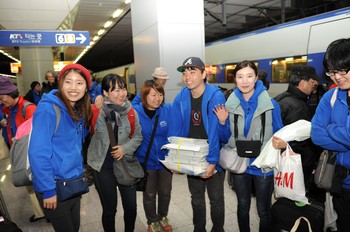“They’re coming, they’re coming,” shouts a young women, looking toward the train pulling into platform 6 at Busan Station. When the doors open, people get off with large suitcases.
They look tired ― yet incredibly happy at the same time. They’ve traveled from Berlin to Busan, 20 days across Europe and Asia. Their objective: To send out a signal against the division of Korea ― and for peace in the country which has been split in two for 63 years.
The “Peace Train,” as the project is called, is part of a peace initiative of the National Council of Churches in Korea which aims to raise awareness of the East Asian country’s continuing division and to campaign for its reunification.
Around 120 participants covered a distance of some 10,500 kilometers en route to the 10th Assembly of the World Council of Churches taking place here from Oct. 30-November 8. The project was supported by several national church organizations.
One of the passengers who arrived in Busan on Monday evening was Daniel Jung. The 29-year-old German traveled the whole distance from Berlin. Last year he completed a spell of practical work abroad as a vicar in Seoul, where he helped the National Council of Churches in Korea prepare the journey.
What especially impressed him was that not only Koreans, but people from 16 nations in all, took part in the trip. “It was incredible to see how many people worldwide are interested in the situation in Korea and are willing to do something to promote reunification.” The participants, aged 19 to 77, came from as far afield as Brazil, Ethiopia, Indonesia and Nigeria.
A journey you only make once in your life
The route initially took the travelers from Berlin ― a symbol of a reunited Germany ― via Moscow and Irkutsk to Beijing. In two cars the participants, who also reported on the project on Facebook, first took the Berlin-Moscow Express, boarded the Trans-Siberian Railway and then went on the Trans-China Railway.
At their stop-offs in Moscow, Irkutsk and Beijing, they met with local church representatives. “There are easier things to do than living in a very cramped space for three weeks,” said Jung about the journey and laughs. Yet it didn’t bother him. “It was exciting to be able to get to know so many people with different life stories to tell and from such diverse nationalities and religious denominations,” he says. “This was a journey you only make once in your life.”
After the participants arrived in Beijing, the organizers had originally planned for them to journey on to North Korea’s capital Pyongyang by plane. They had hoped for the go-ahead from North Korea up to the final minute ― but it didn’t come.
Instead, the participants traveled by train to the Chinese city of Dandong, located on the border with North Korea, where they held a church service with a Chinese community that also includes North Koreans. They then took a ferry to the South Korean port of Incheon, and they continued on a bus to Seoul.
The group completed the last stage ― to Busan ― by the train again. The participants were not disappointed about not being able to make the journey to Pyongyang. “The trip is an initial impetus,” says Jung. Although the journey ended on May 29 with a closing church service, “our commitment will continue,” he added.
Many of the travelers are taking part in the Assembly of the World Council of Churches in Busan, after which they will return home.
The initiators are already thinking ahead. They aim to make the journey again next year ― and, if possible, to Pyongyang as well.

